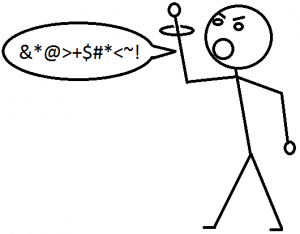It’s been fun, interviewing the other authors with stories in Avast, Ye Airships! Perhaps in the coming weeks, I’ll be able to interview the rest. In the meantime, I’ll resume my normal Sunday postings of writing advice, and today’s topic is profanity in prose, damning in dialogue, characters who cur se.
se.
Considerations
Before letting one or more of your fictional characters cuss, there are some thing to consider. First, does swearing fit that character? In real life, some people swear often; some reserve swear words for unusual situations; and others never utter any profanity. It can depend on a character’s background, upbringing, the character’s present company, the character’s age, the character’s feeling, and the situation.
Another consideration is your audience. Some readers get turned off by too much swearing. Some will even put down the book at the first curse word. Others read right through them without being fazed.
You should also think about the level of intensity of the swear word. Yes, they have levels of offensiveness. These levels are subjective, so what’s low on your list might be higher up for others. As an example, the “c” word for vagina is usually consider much more offensive than the words “damn” or “hell.”
It’s interesting to note the categories of swear words, and what it would say about your character if she uses words from one category only. Swear words seem to be broken down by (1) body parts, actions, or emissions, (2) races, (3) genders, (4) ethnic backgrounds, (5) religions, and (6) occupations.
Consider, also, the country and time period of your story. Swear words vary considerably by nationality and over time.
Methods
If you’re going to allow a character to swear, here are some ways to make it effective in your story.
First, don’t overdo it. For most people, swear words average 0.3 – 0.7% of the words we use, though for some the frequency is 0% and for others up to 3.4%. Overuse of swear words can turn off readers, and give the impression that the author doesn’t have much to say.
Consider the deeper meaning of Lord Byron’s quote, “He knew not what to say, so he swore.” (I swore less frequently after my mother-in-law referred to that quote.) Among other things, swearing can be a sign of low intelligence.
As an alternative to using swear words, consider using regular words in a way that accomplishes the same thing. I’m not talking about silly, substitute swear words like “freaking.” I talking about using regular words in imaginative, creative ways. My Dad said his Marine Corps drill instructor could chew out the platoon for ten minutes without using a single swear word, but every Marine felt he’d been cussed out. Here is a website with some great insults using no curse words at all.
Use swear words to reveal something about the character who speaks them. You can even make certain swear words into a character’s catch phrase. That can help orient the reader as to who is speaking when there’s a long string of dialogue without tags.
Be consistent. If a character swears once, have him swear throughout, though you can change swearing frequency or words as a way to emphasize a change in other aspects of the character.
In summary, don’t be afraid to let a character use profanity, if it’s right for that character and right for your story. But don’t go overboard. I’m damned right about that. I swear, or my name’s not—
Poseidon’s Scribe
